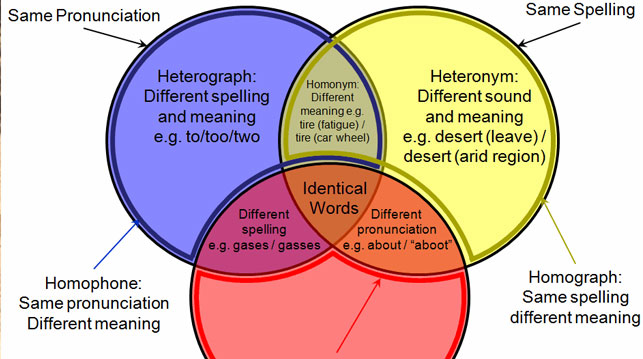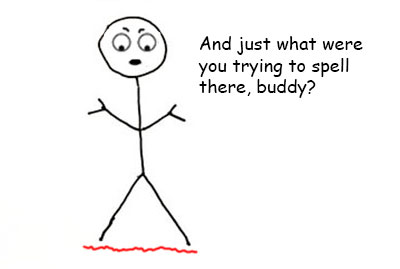
Ah, the double-edged sword of spell-check. That little red squiggle under misspelled words can be so helpful in drawing your attention to words in need of correction. But the absence of that little red squiggle can give a false sense of security, leading you to think your writing is spelling-error free when it might be filled with correctly-spelled incorrect words. One troublesome group of word is homophones.

It’s easy to confuse homophones, homographs, and homonyms. The table below illustrates the differences. I’ve included Greek roots in the table below because the knowing roots helps you keep the meanings of the three words straight.
| Roots | Definition | Example | |
| Homophones | homo (same) phone (sound) | Two or more words with the same sound but different meanings and spellings | to, too, two |
| Homographs | homo (same) graph (writing) | Two or more words with the same written form but different meanings and sounds | desert (a place with an arid climate), desert (to abandon); bow (used with an arrow), bow (to bend in greeting) |
| Homonyms | homo (same) nym (name) | Two or more words with the same spelling and sound but different meanings | Bear (the animal); bear (to support weight); bear (to deal with) |
Get a free sample proofread and edit for your homophones.
Two professional proofreaders will proofread and edit your homophones.
There’s some disagreement about how these terms differ and how they overlap; for example, some people use the word homonym to refer to homographs as well. For today’s blog, I will only be discussing homophones—same sound, different meaning and spelling—because those are the ones that cause errors in writing.
Some homophones are what I’d call elementary. Here are a few examples, but there are many more:
| know/no | to/two/too |
| our/hour | which/witch |
| whether/weather | who’s/whose |
| cell/sell | they’re/there/their |
| buy/by | you’re/your |
| blue/blew | it’s/its |
I call these elementary not because errors with them are rare beyond elementary school (if only!), but because these words all have common, distinct meanings most people are familiar with.
The homophones highlighted in yellow above all include a contraction (two words joined with an apostrophe). Their (not there!) meanings are a bit more subtly distinct, so I recommend reading sentences including them aloud and breaking the contracted word into its components to decide which form is right:
Homophones like whose and its—without an apostrophe—might tend to slip through the radar, so keep a close eye out for such words. Also, depending on your version and settings, Word may autocorrect for some homophone errors; when I tried to write “Its the best kind” I had to choose the option “Change back to ‘its the’” to preserve the error.
Some homophone pairs are made up of words less common in everyday speech or with less concrete meanings, so they can be tough to keep straight. Below is a list of some tricky ones. I’ve noted whether the words are nouns (N.), adjectives (A.), or verbs (V.), and I’ve also left off some of the definitions for the sake of brevity.
Capital: A. Punishable by death (“a capital crime”); N. a seat of government (“capital city”); N. or A. assets or related to assets (“the business’s capital,” “capital gains”)
Capitol: N. The place a legislative body meets (“capitol building”)
Principle: N. An idea, law, or assumption or a basic truth (“the principle of equity”)
Principal: N. A person heading an educational institution (“Principal Skinner”); A. describing a main actor or most important part of something (“the principal defendant”); N. the main part of a fund (“principal and interest”)
Compliment: V. or N. Praise (“She complimented him on his outfit, “What a compliment!”); “with compliments” means “free” (“Dessert is with compliments of the chef”)
Complement: V. Describes things that go well together (“the wine complements the cheese”)
Allude: V. To refer to indirectly (“to allude to a hidden plot”)
Elude: V. To avoid with skill or escape (“elude the dog catcher” or “your humor eludes me”)
Eminent: A. Prominent (“an eminent scholar”)
Imminent: A. About to/definitely will happen (“imminent disaster”)
Illicit: A. Illegal or not allowed (“illicit affair”)
Elicit: V. To bring/call out/forth (“her icy gaze elicits fear”)
As you can imagine, mixing up these homophones can give a very wrong impression about your meaning, or at least make your writing less credible, like any errors do. So, to avoid eluding to the wrong idea, which might illicit scorn in your readers, make sure to check carefully for homophone errors. I hope you noticed the errors in the previous sentence!
Interested in reading up on more commonly confused words, not necessarily homonyms? Check out these past issues of the Proofreading Pulse on between/among and fewer/less, words of comparison and contrast, and affect/effect.
Sarah P.
Get a free sample proofread and edit for your homophones.
Two professional proofreaders will proofread and edit your homophones.
Get a free sample proofread and edit for your document.
Two professional proofreaders will proofread and edit your document.
We will get your free sample back in three to six hours!